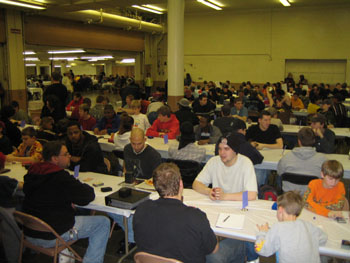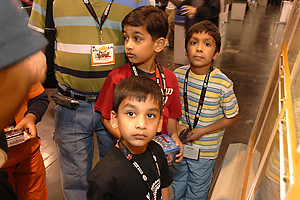
Last week, I talked to the judges about ways to help integrate new players into their existing tournament environments. There are a lot of benefits to everyone when Leagues and tournament areas continue to grow. Since your judges are ready, this week I’m going to talk to you about going out and getting some new players so they can be integrated!
There are some areas out there with a large dueling population, and other areas where not as many people seem to play. If your usual territory is crammed full of players who’ve been coming back for years—full of stores that run a variety of local tournaments and Leagues along with multiple Regionals and maybe even a nearby Shonen Jump—you’ve got it pretty good. Most areas, though, could use a little help, and some have hardly any activity at all. There’s a lot you can do as a player to bring in and keep new players, to build up League and tournament attendance in your area.

Sometimes it seems that there are a lot of players who prefer to “hide” their involvement in the Yu-Gi-Oh! TCG. These are usually school-age players who want to fit into social groups that don’t generally consider games like ours acceptable. If you genuinely get a hard time because you play, you have my sympathies. It is harder to pull new people into the game if you aren’t willing to talk about your interest, so perhaps an attitude change is in order. It could be time to lighten up a bit . . . yes, you are playing a game that’s intended for and marketed primarily to kids age fourteen and under. Deal with it! (I still enjoy cotton candy, and frequently shop for shoes in the kids’ department, where I choose a size 3.) Perhaps you can do something to change the perception your school or group has of the game—you might be surprised how many other closet players are hiding among people you know.
Teach someone new how to play. Teaching other people how to play is one of the best ways you can expand the player base in your area. If people know you enjoy playing, it’s much easier to introduce them to the game. Surely you have a friend, girlfriend, boyfriend, sibling, cousin, or parent who would like to learn. Break out a couple of structure decks and let the teaching begin! Then make sure to take your protégés to League or a local event. Show them how much fun they can have participating in Organized Play.
If you’re really interested in roping in some new players, you should join Upper Deck Entertainment’s Demo Team. The online certification test is pretty straightforward, and the program isn’t difficult to get into or stay active in—the minimum you need to do is run one demo a month. In return, you can earn product rewards and get advance copies of new releases and games. If you work hard and are particularly good at it, you can even get sent to conventions and other large events to run game demos. Not everyone who knows how to play a game can do a good job of teaching or demoing it, but if you’re one of the ones that can, officially joining the Demo Team can go a long way towards getting more people out and playing. You’ll also get to wear one of those handsome black and orange shirts! If judging isn’t really your thing, but you want to expand your horizons beyond just playing, going “pro” as a demoer is a good option to consider.
Apart from teaching the game to others, you may need to make some attitude adjustments to accept new players more openly. If you’ve been playing for a while or have been particularly successful, you may find yourself falling into a rather narrow-minded view of any player who doesn’t seem to match up to your standards. Here are a few handy tips to avoid that:
Lose the bias against new players. Players you haven’t seen before aren’t automatically stupid or unskilled. They are not a “nobody” simply because you haven’t heard of them.* You just might have to accept that, unlike the rest of us, they weren’t born knowing how to play and they might still have a bit of ground to cover. Why not help them out? Answer questions or offer deckbuilding advice if they are looking for it. Few of us learned everything we know about the game completely on our own.
 Lose the bias against kids. This game is marketed to kids. Which means kids buy a lot of the cards, watch the TV show, and may eventually make the leap from collecting and watching to putting together a deck and dueling. The mechanics of Yu-Gi-Oh! can make for a complex game to master, but don’t automatically write off every kid you see as a Jaden wanna-be with a box full of cards purchased by his or her mother. I know quite a few very young players who pay for their cards themselves and can throw it down in style. They’re there and they have a right to play too, so set a good example for those who have yet to learn the correct way to behave at a “real” tournament.
Lose the bias against kids. This game is marketed to kids. Which means kids buy a lot of the cards, watch the TV show, and may eventually make the leap from collecting and watching to putting together a deck and dueling. The mechanics of Yu-Gi-Oh! can make for a complex game to master, but don’t automatically write off every kid you see as a Jaden wanna-be with a box full of cards purchased by his or her mother. I know quite a few very young players who pay for their cards themselves and can throw it down in style. They’re there and they have a right to play too, so set a good example for those who have yet to learn the correct way to behave at a “real” tournament.
Lose the bias against “casual” players. You don’t have to be totally focused on stomping the tar out of everyone to play a card game. Lots of players aren’t necessarily interested in winning a Regional or heading to Nationals—they’re looking for an enjoyable game to play as a recreational activity. Don’t look down on players with this attitude, because they’re going to help build up the numbers at League and locals, and . . . well, it is called a trading card game, right?
Accept new players. When new players show up at your usual events, do your part to make it a good experience. If you’re not comfortable going over to them and introducing yourself, that’s fine, but if you’re paired up against them, behave yourself. Don’t belittle or insult new players, and resist the temptation to “haze” them or push them out of territory you perceive as your own. If you are one of those outgoing, friendly kinds of people, then by all means introduce yourself or ask for a duel. I usually get plenty of attention when I visit a League or local, and it does make a difference. If I was totally ignored and new to the game, I don’t know if I’d want to go back.
As I stated in the other article, adding new players to the game keeps it in a constant state of renewal. What happens when a League drops from thirty players to ten to two? Most shop owners will close the League. What happens when tournament attendance drops from fifty to fifteen to three? TO’s will stop running events, and players start talking about how the game has died. What makes a game die out in one area and enjoy a robust health elsewhere? There are plenty of factors to look at, but attracting a continuous stream of new players will help revitalize any area. We all had a starting point for playing this game, and excluding anyone coming in afterwards won’t do much except help kill off the game in your area. As long as people keep playing, there’s all the incentive in the world for a game to continue to be produced and supported. New players are a vital part of that: see what you can do to bring in a few more.
*I entered a tournament some months back. I certainly don’t expect everyone to know who I am, but a few of the judges who did know me were vastly entertained to hear me later referred to by one of the players that I defeated as “that hawt (expletive) that smoked me.” The world is full of players of all skill level that you haven’t met yet, so . . . yeah.